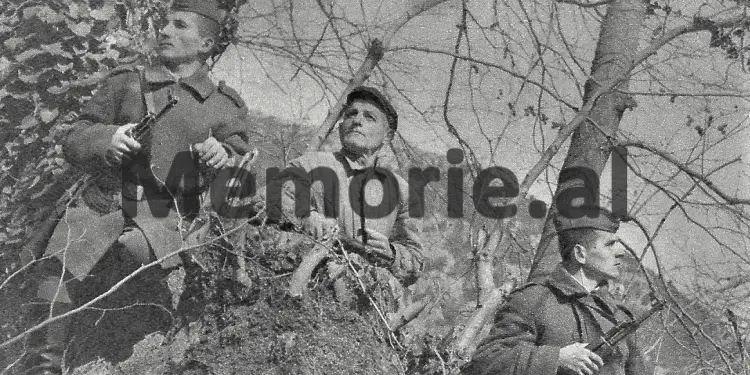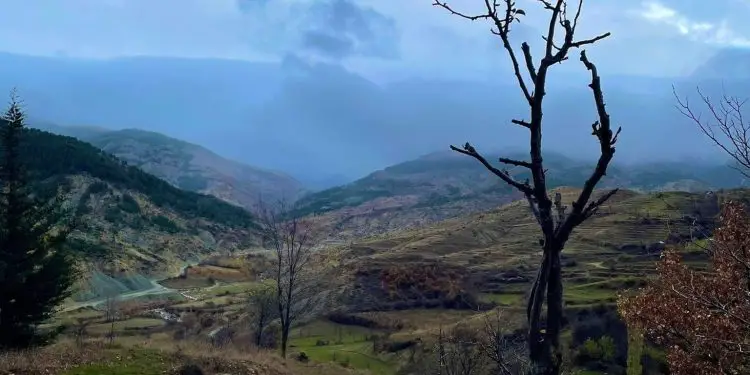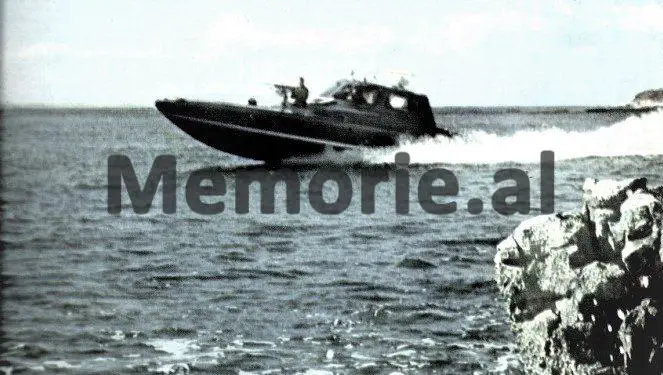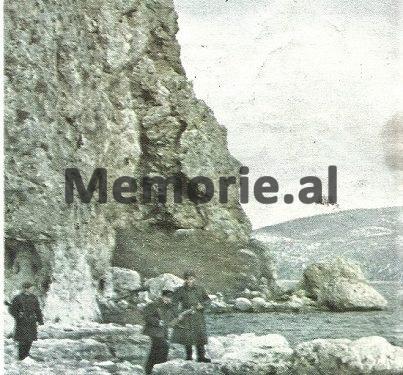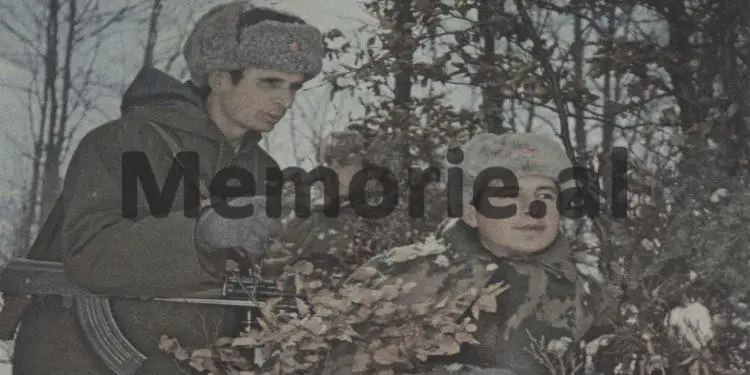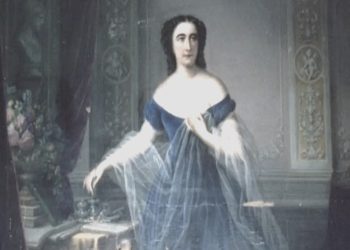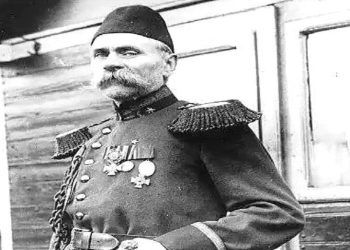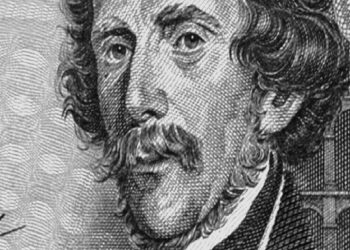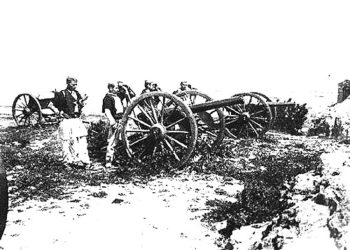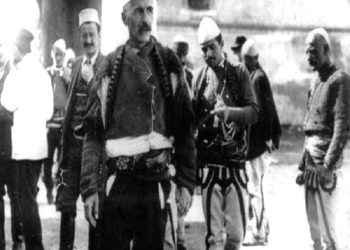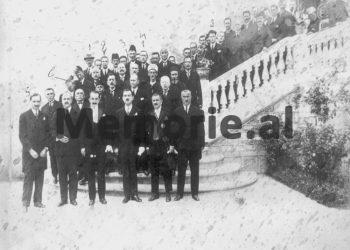By Raimonda Moisiu
– “Athinaiki” newspaper, on the front page, in the special column, published the article with the title; “The eight escaped Albanians explain the reasons for the escape”.
Memorie.al / He shared his youth years with Ymer Dishnica, Mikel Zavalan, Safet Butka, Koci Xoxen, dozens of former high school students of Korça from the 30s and embraced their ideal for a free Albania. He was among the first to line up at the barricades of the anti-fascist movement, but he would be immediately disappointed when the days of freedom would fall into the hands of communism. Forever separated from his early friends, he would take the path of escape, to run away, as far as possible.
While Refat Hysen’s life followed this metamorphosis, exchanging his beloved homeland for Australia, the extreme continent, childhood memories and experiences from Kamenica, where he was born and grew up, would remain behind, which he did not want to exchange for anything in the world. . More than a survival challenge, the escape for him, as well as for hundreds of others, was a kind of protest against the dictatorship that plagued Albania after the Second World War.
Refat Hyseni became part of those intellectuals who with their strength and vitality openly demonstrated the truth that “The Motherland did not have life, it did not breathe”, that something had to change for a wider scope of the comprehensive spheres of life, for that ideal that they had fought for, for a future of generations to come, to lay the foundations of a democratic state. Rising above the communist terror, they express their enthusiasm for the “forbidden world”, for the world outside the walls of Albania, “this granite rock on the shores of the Adriatic”, as the communist ideology propagated.
It was not just a disagreement with the new reality that dominated the country after liberation from the occupier, but much more than that. The rebellion of those who had been the protagonists of the Anti-Fascist Movement, the former comrades in arms and the ideals of the communist leaders, of those who preceded the reconstruction developments, became the first opposition that came out against the lying, hypocritical, murderous trend. Crucified in the face of brutal repression, they had to take risks to escape. To get away as far as possible from the mortar that reoccupied Albania after the Anti-Fascist War.
Challenge to survive
When he returns to the moments of escape, Refat Hyseni, at the age of 85, says that they were the most difficult moments of his life. Chosen as the only way for human survival, escape for him has been an extraordinary undertaking. “Anyway,” he adds, “things went well and thanks to God, everything went without too many sacrifices.” Refat Hyseni pressed this decision into his head one day in May, while he was working in his yard, there in his native village, in Kamenica e Korça, and he was watching his sick daughter-in-law, who had no way to cure her.
He spontaneously decided to run away, while looking at the mother with tears in her eyes, silently lamenting that she had nothing to cook for her children. He gathered his mind for this path, as he experienced the contempt of his ideal friends, the way they suddenly threw him away without remembering, destroying his future dreams. He had to run away, run away, otherwise he had to crawl all his life…
That May morning for him was very important. An important decision had matured in itself. He stopped his work for a moment, looked around and stared at the mountain of Kozel, where behind its slopes, there was another world, completely different from that of his people. It had to be passed there, to touch the free world, the real life with free breathing…
He discussed the secret thought that came from the depths of his soul with his brother, Abedin, and then with some of his relatives and fellow villagers. Then he started making the plan with them. With his own hand, Refat Hyseni would determine the entire route from which they would pass, carefully specifying every detail and precaution, every path and passage. Above all, he had to keep the dangerous adventure a secret
The ideator of the escape
Refat Hyseni, was the man who devised the sensational escape, born on February 21, 1923 in Kamenica, Korça, son of a patriotic family, he would become known in the early 50s, for the incredible “betrayal” of the escape. , together with seven members of his tribe. He completed his early education in the city of
Erseka, where he befriended and became an ideal friend with the brother of the communist general, Petrit Dumes, the martyr, Baki Dume.
From here he continued his studies at the Technical School of Korça, which was under a shelter with the French high school of that time. There his life would take on a turbulent dimension. Contact and company with many high school students with progressive ideas for the time, such as; Ymer Dishnica, Enver Hoxha, Mikel Zavalani, Safet Butka, Koçi Xoxe, etc., would create in the boy from Kamenica, the feelings of a young man who aspires a lot for his homeland. Getting to know and creating a family with his wife, Hanijen from Vinçani i Korça, would make his life more complete.
At first, they would create their shelter in the city of Korça. Yes, only for a short time, as the house in which they lived belonged to his uncle, Zalo Fama, the former prefect of the Zogu Monarchy period, and as such would be targeted by the partisan communist forces, to be seized, meanwhile that its inhabitants would move to the village. This would somewhat shock Refat Hysen, but as it was a time of war, he would submit to fate, without asking for explanations from those who had confronted him, as the grandson of the official of the former King Zog.
However, he would show his patriotic feelings in the future, by joining the partisan units, which fought the invaders hand-to-hand. So until the day of liberation. Participation in the ranks of the anti-fascists and the completed school diploma would serve Refat Hysen, to integrate into the ranks of the forces of the Defense Division, as a soldier, first with the rank of lieutenant, then with higher ranks . As a soldier, he would serve in Vlora, Berat, Tirana, Kukës, etc., for several years, until someone discovered the “defect” in his biography, the family connection with the former prefect of Zog.
That would be enough to be declared undesirable for the army. This would be enough for the course of his life to take a different trajectory. First, they lower him in rank, later they release him from the army and send him to the village. This slap would then follow with the difficult economic life, extreme poverty, his dissatisfaction with the system, class discrimination, even human contempt, which would make him decide to escape, leaving the day before, from the repressive reality. Certain events of the time, such as the escape of many people in groups and their settlement in Western countries, undoubtedly had their influence on this decision.
These sensational escapes, such as that of Ekrem Bardhë with his family from Cologne, that of the group of Ditar Kurtesi, the “myth” of escapes, which for more than two decades, would make the Albanian State Security officers “dreadful”, leaving and entering Albania many times, they had shaken the communist regime from its foundations. Refat Hyseni, among other things, had “loved” the figure of Ditar Kurtesi, who was said to have entered the Albanian territory so often that they had seen him talking and eating bread with the sawmillers of Ballabanova, Katundi, Treska, Trebicka, Radovicka, etc.
For the man who was treacherously beaten, because he was a relative of one of the officials of the former King Zog, the escape of the Foto Basho group was impressive, where a total of 85 people, with mules loaded with household items, had crossed the state border, on the day in the sun. In these examples, Rifat Hyseni found strength and security for the sensational decision. His case would be added to this story, which spoke of physically abandoning the homeland, in order to remain spiritually connected to the whole life…!
Escape, anxiety, hope
“Let’s go and save”! His brother, Abedin, would be the first to present his bold decision, then he would sit down with his cousins; Ahmet and Sali Hyska, Xhemal Ahmeti, Ali Rizai, Estref Aliu and in the end, when everything was ready, he would explain to his wife, Hanija. Although sick, she did not say no to the lover of her heart, the one who had promised her and had forgiven her heart. And so one day in May, together with Refat, Ali, Riza, Abedini and Estrefi, they take the mules and go to the mountain of Kozel, under the pretext of making wood. There they define in detail the route from where they would cross the border to the Greek land.
When they had completed all the measures, on the night of June 5, dawning on June 6, 1954, all eight, seven men and one woman, left their homes and set off, climbing the mountain slope in complete secrecy. A challenge lay ahead. They had left behind the beloved Kamenica, the people of the relatives, the memories of the past years and the worries of a sad life. After so many years, Refat Hyseni remembers with pain the moments of parting with his mother, who, while escorting him into the distance, cried under his breath and wished him with the words of his heart “Sunny road!”.
To the state border with the territory of Greece, it took tens of hours of travel in the dark, at night in the rain. The moment of crossing the border in the area between Nikolica, Kozel and Arrze i Devolli, was the first triumph. There, the eight sons of Kamenica, overcome with each other, shed tears of anxiety, hope, longing, farewell, pain for what they left behind. With tearful and tired face, they looked once more towards where they had passed. They were gone forever! But that was not all. The first moments in the foreign land are taken in an informative conversation by the Greek Asphalia. From there, other difficulties will start…!
In front of the Greek newspapers
“We ran away to survive”! This was the first response of the eight fugitives from Kamenica and Korça, in the face of the interest of journalists from the neighboring country. A simple news was enough for their clandestine arrival there and they immediately found themselves in front of 60 Greek journalists. The confessions about them continued for hours. This is how this event was translated the next day, in the Greek newspapers…! The newspaper “Athinaiki” of June 6, 1954, on the first page, in the special column, simultaneously with the photos of the fugitives, publishes the article with the title; “The eight escaped Albanians explain the reasons for the escape”.
Among other things, in this article it is underlined; “There are eight people who escaped on June 6. Seven men and one woman. In front of Greek and foreign journalists, they explain in detail the difficult economic situation, poverty, class discrimination that was done to them through the class war, surveillance, deportations, extrajudicial killings, exterminations, political imprisonments without cause, etc.
The “Imerisia” newspaper, dated June 8, 1954, along with their photo, would quote on the front page: “Albanian fugitives, who crossed the border at dawn on June 6, appeared yesterday in front of television, the Greek media and foreigners, surrounded by 60 journalists, explaining the situation in their country and the communist regime. They are: Ahmet Hyska, Refat Hyseni & Hanije Hyseni (spouses), Abedin Hyseni, Sali Hyska, Ali Riza Mydini, Estref Aliu and Xhemal Ahmeti. All eight are farmers and they surrendered at the border military point of the village of Alevista. Their condition was very miserable. They were taken into protection and care by the Greek authorities.”
In the camp of political immigrants
Hard and surprising, the days would follow in the immigrant camp where all those who entered the Hellenic land illegally were gathered. The man who would welcome them and take them there was Tosun Mehmeti, a fellow villager of theirs, an ardent anti-communist, who escaped a few years ago. He would meet them there with Abbas Ermenji, Zef Malaj, Luan Gashi, Gani Hamit Vlora and some Jews, some of whom had arrived there after escaping from Albania. Among the first foreign visitors who met them, was the head of the Intelligence Service for the Balkans, the English colonel Hilton, who, as Refati recalled, spoke extremely clean Albanian and knew very well the situation in Albania. Under his care, the eight fugitives would begin the official immigration procedures.
Based on this, each of them, according to the international statute of rights to flee their country of origin, applied to leave for the USA and Australia. Five of them won political asylum in Australia, with the support of their relatives in the distant continent. Meanwhile, three others were legalized to immigrate to the USA. Another life started for them. Yes, they never separated spiritually from their homeland. With the hope that one day they would return to the reborn Albania, some of them died abroad.
Sad epilogue
Spent a lifetime far, far away from mother earth. Some died in and abroad. Others became fathers, grandfathers and even great-grandfathers, without ever seeing the face of their hometown. Refati and his wife Hanije Hyseni are currently living their third year in Brisbane, Australia. Abedin Hyseni, Refati’s brother, created a family, lived and worked until he died, leaving behind children, grandchildren and great-grandchildren, in Australia. Likewise, Ahmet Hyska, who was able to return from Australia, only after the 90s
While narrating this sad epilogue, the man who devised this extraordinary decision in the early 50s, says that Ali Riza Mydini, spent his whole life in the USA, and now lives in Tirana, Sali Hyska in Australia , where he passed away, leaving behind his scars. Likewise, Estref Aliu and Xhemal Ahmeti lived and worked, until they passed away, in the USA. He says that together with his wife, they came to Albania for the first time after 40 years.
They experienced an uncontrollable joy, even kissing the stones of the road of their Kamenice, which they had missed for a whole life…! This is their story. The painful story of people fleeing for a better life, to escape the persecution of communist hell…!
High school students
For the first time, he heard about the ideals of freedom from the mouths of high school students of Korça. It was during this period that Refat Hyseni was in daily contact with well-known names of Albania at that time, who would leave their mark on his formation. In the memory of the man who spent most of his life in distant Australia, the names of Enver Hoxha, Ymer Dishnica, Mikel Zavalani, Safet Butka, Koçi Xoxes, etc., have remained, who in their early youth revealed the dream of freedom. “The metamorphosis, – says Refati – lies in the betrayal that Enver did to this holy cause”. Memorie.al




